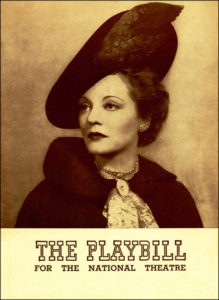In my latest “Sightings” column, which appears in the online edition of today’s Wall Street Journal, I plan a theater season devoted exclusively to women playwrights. Here’s an excerpt.
* * *
Do female playwrights get a fair shake? Not according to the numbers. The best available statistics indicate that somewhere between one-fifth and one-quarter of the plays professionally produced in the U.S. are by women. And who’s to blame for this gender gap? Paula Vogel, who won a Pulitzer Prize in 1998 but only just made it to Broadway this past April with “Indecent,” claimed in a recent tweet that white male critics “help close us down.” To which Lynn Nottage, another Pulitzer laureate who had an equally belated Broadway premiere in March with “Sweat,” replied, “The patriarchy flexing their muscles to prove their power.” I very much doubt it’s that simple, but whatever the reasons, there’s surely something amiss.
 As a result, a growing number of women now support “gender parity” in American theater, which is too often a euphemism for more or less rigid gender-based quotas in programming and hiring. That road, alas, leads to all sorts of unintended and potentially destructive consequences. Nevertheless, it’s incontestable that there are lots of high-quality plays by women that aren’t as well-known as they ought to be—and, in the case of pre-1960 plays, simply aren’t being staged at all….
As a result, a growing number of women now support “gender parity” in American theater, which is too often a euphemism for more or less rigid gender-based quotas in programming and hiring. That road, alas, leads to all sorts of unintended and potentially destructive consequences. Nevertheless, it’s incontestable that there are lots of high-quality plays by women that aren’t as well-known as they ought to be—and, in the case of pre-1960 plays, simply aren’t being staged at all….
So what’s to be done? I’ve conducted a thought experiment. If I were running a regional theater company and decided to devote an entire season to plays by women, which ones would I choose? Within five minutes, my imaginary season was planned. Not only did I make a special point of including two pre-1960 works that are now largely (if not entirely) forgotten, but I made a point of steering clear of the usual staples. No “Little Foxes,” no “Raisin in the Sun,” no Caryl Churchill or Sarah Ruhl—just six fine plays that I picked for no other reasons than that I think they’re good and are likely to appeal to the average playgoer, regardless of gender….
* * *
For the record, my six picks were Rachel Crothers’ Susan and God, Enid Bagnold’s The Chalk Garden, Lynn Nottage’s Crumbs from the Table of Joy, Julia Cho’s Durango, Amy Herzog’s After the Revolution, and Lydia R. Diamond’s Smart People.
Read the whole thing here.
The trailer for the 1940 film version of Susan and God:
